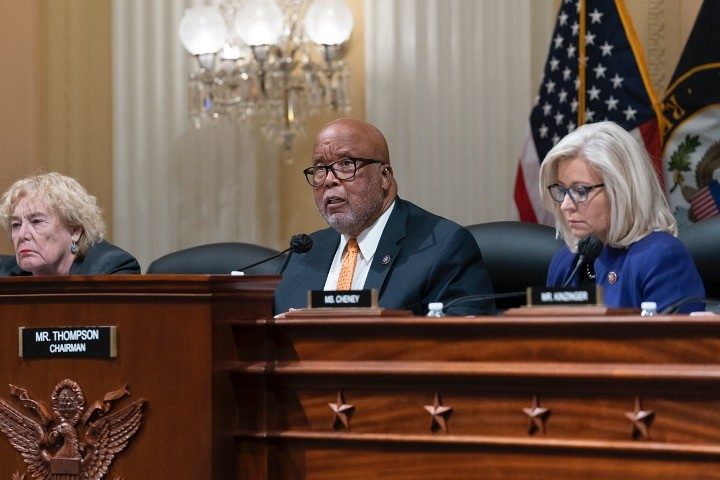
The select committee that is probing the mostly peaceful protest at the U.S. Capitol last year is running roughshod over the rights of American citizens, the New York Times reported on Saturday. But that fact isn’t what bothers the Times.
Rather, its reporters warned that if Republicans retake the House of Representatives in November’s midterms, they could use the same tactics against Democrats. As well, the committee might embarrass itself and turn up nothing to implicate President Trump or anyone else it believes is responsible for the “insurrection” on January 6, 2021.
But even more disturbing than the Times’ take on the committee is the newspaper’s failure to fully report its totalitarian abuse of power in pursuing Taylor Budowich, a former Trump campaign official.
The only person interested in that case seems to be Glenn Greenwald, who explained in January what the Times did not. The committee connived with Budowich’s bank, J.P. Morgan, to get his financial records without his having the chance to fight either the committee or the bank in court.
Upshot: Run by former insurrectionist sympathizer Bennie Thompson, the committee has arrogated unto itself the power to act as a prosecutor and use subpoenas to seize records to which it is not entitled.
Might Backfire
At least the Times confessed that the committee is “employing aggressive tactics typically used against mobsters and terrorists.”
Former federal prosecutors are running the investigation, the newspaper reported, and are sweeping up everything they can in the vindictive effort to punish Trump, his family, and his supporters for daring to question the legitimacy of Biden’s suspicious victory in November 2020:
The committee has interviewed more than 475 witnesses and issued more than 100 subpoenas, including broad ones to banks as well as telecommunications and social media companies. Some of the subpoenas have swept up the personal data of Trump family members and allies, local politicians and at least one member of Congress, Representative Jim Jordan, Republican of Ohio. Though no subpoena has been issued for Mr. Jordan, his text messages and calls have shown up in communications with Mark Meadows, the former White House chief of staff, and in a call with Mr. Trump on the morning of Jan. 6, 2021.
Additionally, the Times reported, the committee has turned at least “six lower-level Trump staff members” into witnesses. The newspaper did not say how the committee did so. The committee is also considering “granting immunity to key members of Mr. Trump’s inner circle who have invoked their Fifth Amendment right against self-incrimination as a way of pressuring them to testify.”
Democrat Stanley Brand, who represents a top Trump aide and is routinely involved in congressional probes, is worried. For the Democrats.
“When a frontier is pushed back, it doesn’t recede,” he told the Times. “They think they’re fighting for the survival of the democracy and the ends justify the means. Just wait if the Republicans take over.”
Then again, the Times continued, “the committee’s aggressive approach carries with it another obvious risk: that it could fail to turn up compelling new information about Mr. Trump’s efforts to hold onto power after his defeat or to make a persuasive case for a Justice Department prosecution.”
Taylor Budowich
The newspaper used Budowich to show just how “aggressive” the committee has been. He turned over 1,700 pages of documents and testified for about four hours.
But after that, “Budowich learned that the committee had requested financial records from his bank related to pro-Trump rallies. A federal judge turned down an emergency request by Mr. Budowich to force congressional investigators to relinquish his banking records, which JPMorgan Chase had already given to the committee.”
Yet that short account doesn’t do justice to the committee’s Javert-like zeal.
In January, Greenwald divulged the full, frightening story.
“What Congress is barred from doing, as two McCarthy-era Supreme Court cases ruled, is exactly what the 1/6 committee is now doing,” he wrote:
conducting a separate, parallel criminal investigation in order to uncover political crimes committed by private citizens. Such powers are dangerous precisely because Congress’s investigative powers are not subject to the same safeguards as the FBI and other law enforcement agencies.…
The Congressional 1/6 Committee has been secretly obtaining private information about American citizens en masse: telephone records, email logs, internet and browsing history, and banking transactions. And it has done so without any limitations or safeguards: no judicial oversight, no need for warrants, no legal limitations of any kind.
That is what the committee did to Budowich. It had help from his bank, JPMorgan, and its attorney, who just happens to be Loretta Lynch, former attorney general for the Obama administration.
The committee subpoenaed JPMorgan and told it to produce Budowich’s records by December 7, 2021. The bank, advised by Lynch, “bizarrely requested that the deadline be extended until December 24: the day before Christmas, knowing that courts would be closed that day and the next.”
Even worse, though, the bank sandbagged Budowich:
Only on December 21 — when Budowich was in Washington for his testimony before the committee — did JPMorgan send him notice at his home that it had received a subpoena and intended to produce the requested documents on December 24: just three days later. As JPMorgan and Lynch knew would happen, Budowich did not see the letter until he arrived home on the evening of December 22: less than forty-eight hours before the bank told him they were going to give up all of his financial records to the committee.
When Budowich’s attorneys asked the bank to seek an extension from the committee, the bank refused — again, advised by Lynch. The bank wouldn’t even give a copy of the subpoena to Budowich.
Budowich’s lawyers did everything possible to seek judicial intervention before JPMorgan gave all his financial documents to the committee, but the timing agreed to by the committee, Lynch and the bank — documents produced on Christmas Eve, with notice to him arriving just a couple days before when he was testifying in Washington — made it impossible, by design. As a result, JPMorgan gave all of his banking records to the committee without even seeking an extension.
Budowich was therefore left with no alternative but to file an after-the-fact lawsuit against House Speaker Nancy Pelosi and the committee members, seeking an emergency injunction against the committee’s use of his banking records. In response, both the committee and JPMorgan argued that the entire question was “moot” given that they already handed over the documents.
In other words, lawyers for the committee and Loretta Lynch created a plot whereby JPMorgan would notify Budowich of its intent to hand over the documents right before Christmas, so as to purposely deny him time to seek a court ruling, and then used the fact that he was “too late” in filing as a ground for arguing that the court should shut its doors to him and refuse to even give him a hearing.
Frighteningly, although the law prohibits the bank from surrendering such records until it notifies the client — who’s entitled to dispute the subpoena — the committee claims an exemption from that law because it applies only to federal law-enforcement agencies.
Expect a challenge to the committee’s claim of unlimited investigatory power to land before the U.S. Supreme Court. If SCOTUS doesn’t act, no American will ever again safely challenge the government or an election, and anti-government protest might be squelched forever.
And that, presumably, would be fine with the Times.
H/T: Breitbart



